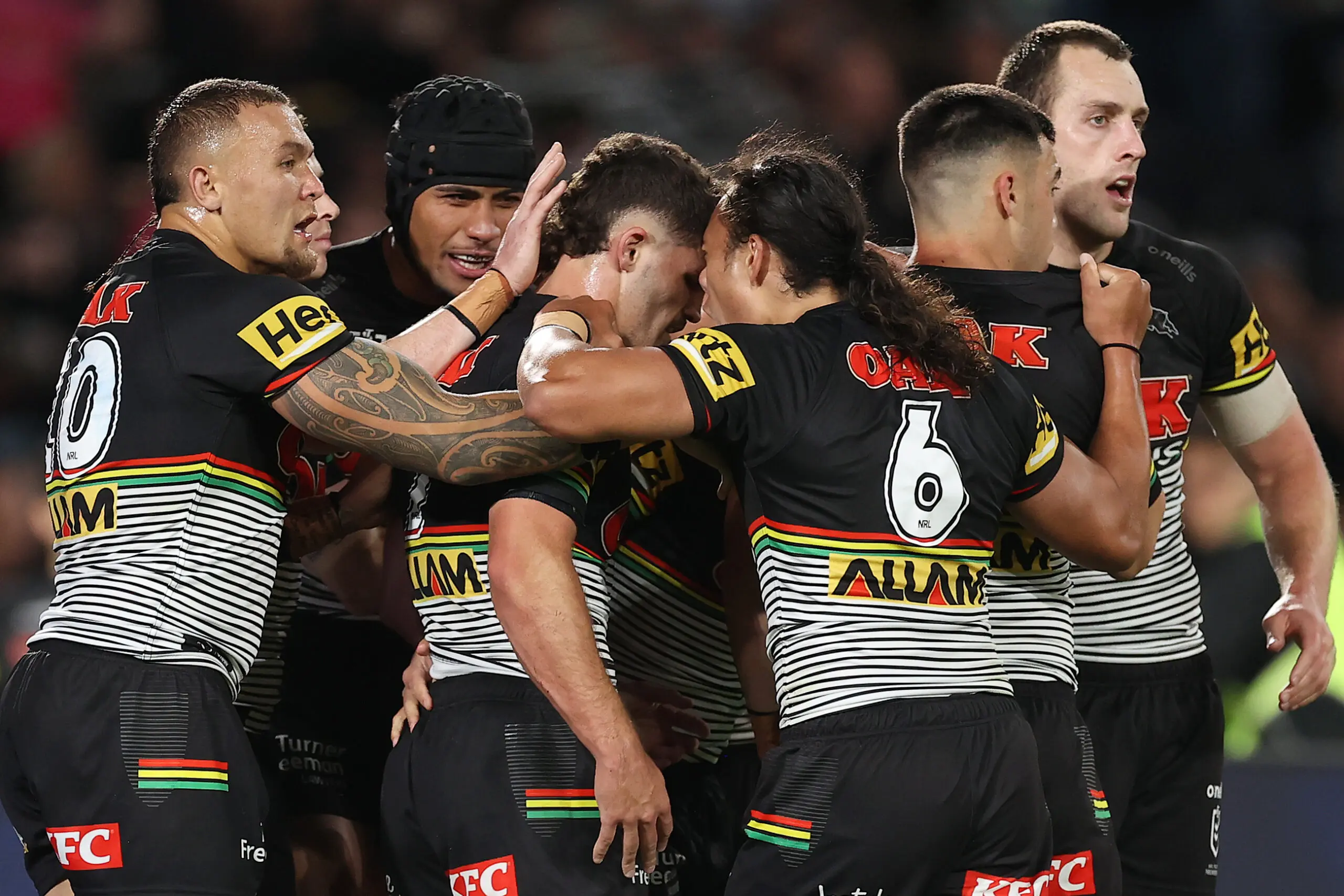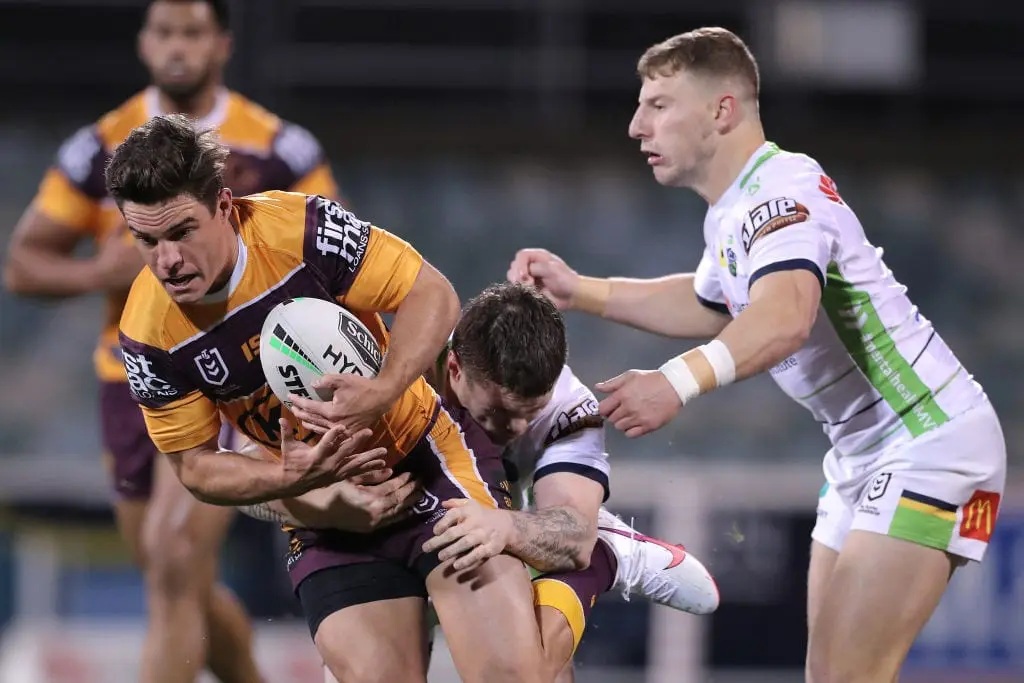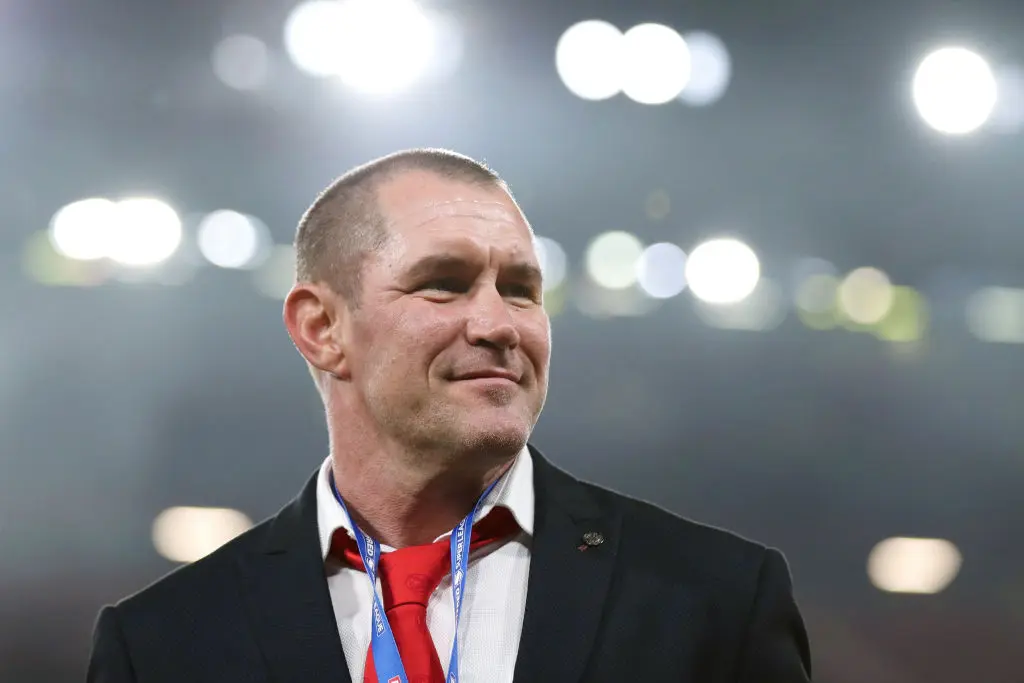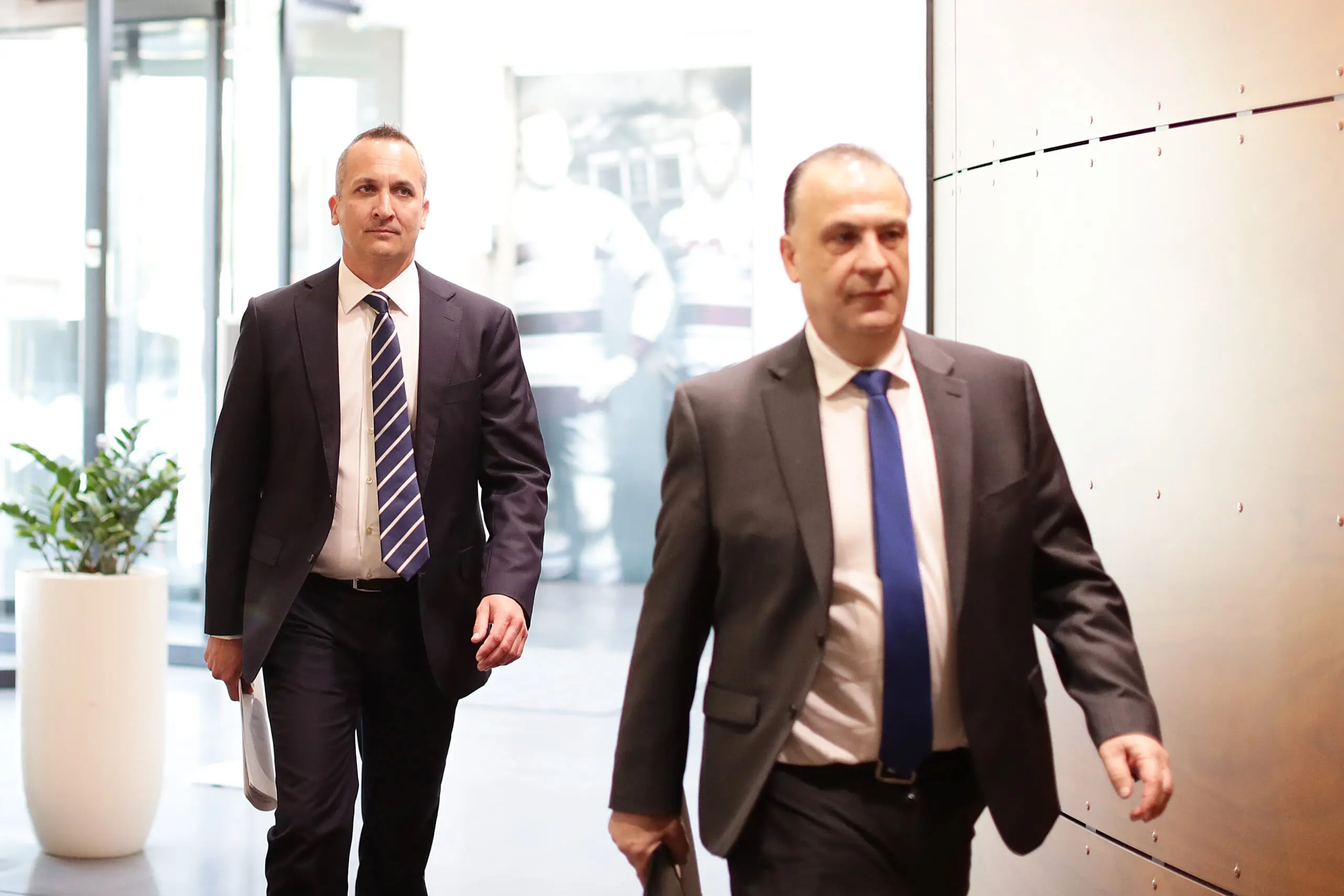And so, just like that, 2022 draws to its close. An NRL season without lockdowns, a Rugby League World Cup, player moves, a salary cap that still may not be locked in and a stunning State of Origin result have highlighted a chaotic 12 months in the rugby league world.
Rugby league graced the calendar all the way from the middle of February through to the end of November, from NRL trials and the NRLW, through to the end of the Rugby League World Cup.
In between, the Penrith Panthers claimed their second straight title, two different NRLW winners were crowned, Kristian Woolf led St Helens to a fourth-straight English Super League title, a former NRL player in Brodie Croft delivered to be named the Man of Steel and the Blues fell apart in the men's Origin arena, before the women were able to restore some glory.
Penrith Panthers do the double
There is no doubt anymore - the Penrith Panthers are the best NRL team of the current generation.
A team made up mostly of local juniors won their second straight premiership in their third straight grand final, dominating the Parramatta Eels at Homebush.
That followed not only last year's grand final win over the South Sydney Rabbitohs, but also a season where they were barely challenged.
From start to finish, the men from the foot of the mountains didn't put a foot wrong, winning 20 of their 24 games and conceding only 330 points across the entire season.
The minor premiership was wrapped up with weeks to spare, and despite the enormous toll Origin took on the club, they never once slowed down, with Ivan Cleary's side winning through their qualifying final, and then taking the chocolates against South Sydney before beating Parramatta.

The club as a whole were on another level this year, with Penrith winning the NSW Cup, State Challenge, Jersey Flegg and SG Ball competitions, while also making the finals at Harold Matthews Cup level.
While Penrith were the story of the season in their second straight premiership, there were plenty of other sub-narratives that defined the season.
RELATED: The top ten games of 2022
The North Queensland Cowboys and Cronulla Sharks - who both finished in the top four - were the season's susprirse packets. An incredible campaign from two sides who many had predicted to finish at the wrong end of the ladder will only make for a better 2023 season.
Parramatta's push to their first grand final in more than a decade, with the blue and gold finally breaking through their endless run of semi-final exits.
There was Melbourne's fight against injuries, the Broncos bouncing from fourth spot to outside the top eight in the final six rounds and the Canberra Raiders sneaking into the finals before beating the Storm in the opening week of action.
The Sydney Roosters fight to remain in the top eight, and South Sydney's resurgence through the second half of the year also made for a compelling tale, as did the Manly Sea Eagles' fall from grace after the jersey incident. Des Hasler ultimately lost his job, and the Northern Beaches-based side go into the 2023 season under new management.
The Canterbury Bulldogs failed to rebound after their roster overhaul and also enter 2023 under a new coach, as do wooden spooners the Wests Tigers.
The New Zealand Warriors were finally able to return home at the back end of the season, while the Gold Coast Titans and Newcastle Knights will need major improvement to keep the heat off in 2023 after disappointing campaigns.

New-look Queensland run Turbo-less Blues ragged
If you listened to certain sections of the media, this was going to be the most one-sided Origin series of all-time.
Queensland surely couldn't hold a candle to the Blues who were about to embark on their own new dynasty.
It's a story we had heard before the 2020 series when Wayne Bennett's Maroons upset the Blues, but this time, there was no Bennett.
New South Wales first blows were in the form of injuries, with Latrell Mitchell and Tom Trbojevic rubbed out of the series. The duo of free-roaming centres more used to playing fullback made up much of the difference between the two states in 2021.
But what was failed to take into account was the new-look Maroons. A new crop of forwards who screamed Origin. Reuben Cotter and Patrick Carrigan were the inspirational leaders, but the entire side stood up to be counted in the middle third.
That was backed up by serious talent in the backline, and a spine who found their mojo during the series. Cameron Munster, Daly Cherry-Evans and the Ben Hunt and Harry Grant combination at hooker just worked.
Still, it was a narrow, hard-fought win for the Maroons in Sydney during Game 1. Dane Gagai, Cherry-Evans and Valentine Holmes would all find the try line for Queensland as Munster won the best on ground honours.
With Game 3 in Queensland, it was always a must-win encounter for New South Wales during the opener, and while they went to Perth with a 44-12 win in Game 2, there was still the Suncorp Stadium factor in Game 3.
Over 52,000 fans filled Australia's best rugby league venue for the decider, and Queensland, despite going behind in the first half, would put on two unanswered tries in the final 20 minutes to claim a famous Origin series victory.

Blues hold their own in women's Origin
But it was a different story in women's State of Origin.
In the final year of a one-game series, the venue would be a cold Canberra where over 11,000 fans packed into GIO Stadium to watch a game that has improved in quality and stature with every passing year.
The rivalry now matches that of the men's Origin, which for so long has been the yardstick by which to measure the game's elite players.
And this game lived up to all the hype that it should have.
It went back and forth during the first half, with four tries in the opening 21 minutes.
Destiny Brill would cross for Queensland, before star fullback Emma Tonegato and five-eighth Kirra Dibb would put the Blues back in front with two tries in as many minutes.
When Tarryn Aiken crossed with a try for the Maroons in the 21st minute, only a conversion stood between the two sides.
A penalty goal for the Blues had them up four at the break, and another soon after by six, but an Evania Pelite try for the Maroons cut the lead to two with just over 20 minutes to play.
Isabelle Kelly would eventually put the icing on the cake for the Blues with a try in the 67th minute during what was a tense 20 minutes with both sides in the game up until the final siren.
More games in the women's Origin concept next year will be fantastic as the sport continues to grow.

Roosters and Knights break Broncos' NRLW stranglehold
After the disappointment of the 2021 postponed NRLW season, 2022 promised to be the biggest year on record for women's rugby league.
An NRLW season to kick things off, state leagues and State of Origin in the middle, another NRLW to finish, expansion promised for 2023 and a World Cup to fight for tickets to.
The New Zealand Warriors may not have been in the competition, but the season would expand to six teams with the addition of the Gold Coast Titans, Parramatta Eels and Newcastle Knights.
The Brisbane Broncos had won each of the first three campaigns in 2018, 2019 and 2020, and there was no reason to think they wouldn't do similar with two seasons in one year.
That looked like it was going to come true as well after Brisbane finished the 2021 postponed season as minor premiers, but it wasn't to be, with the Roosters knocking them over in the semi-final 22-16. The St George Illawarra Dragons beat the Gold Coast Titans in the other semi-final to advance to the final, where they fell to the Roosters at Redcliffe.

Fast forward to the second installment for 2022, and for the first time in competition history, the Broncos missed the finals altogether.
New Zealand star Raecene McGregor, who would win the NRLW Dally M medal for the 2022 season, led the Roosters to the minor premiership, while the Dragons again qualified for the final.
But this time, neither of the traditional Sydney rivals would make the final.
Instead, it was two expansion clubs who qualified, with the Parramatta Eels beating the Roosters 24-10 in one semi-final, and the Knights knocking over the Dragons 30 points to 6 in the other.
That set up the NRLW decider on NRL grand final day, with the Knights partying all the way back to the Hunter on the back of a dominating 32-12 win at Homebush.
Brodie Croft the man of steel as St Helens make it four in a row
The English Super League season saw Kristian Woolf cement his status as one of the game's great coaches in the country by winning his third straight title.
It was also St Helens' fourth title in a row, with the club winning the decider over Leeds 24-12.
Winning 21 out of 27 games throughout the course of the competition, they won the league by four points over Wigan, with Huddersfield, Catalans, Leeds and Salford all making the finals.
At the other end of the table, it was a tale of woe for Toulouse Olympique, with the Frnech club finishing eight points adrift of Warrington to be relegated back to the Championship after their first season in the top flight of English rugby league.
The finals series saw Leeds and Salford both perform major upsets in the first week, with Leeds winning away over Catalans, while man of steel Brodie Croft led Salford past Huddersfield in a dominant 28-0 beatdown.

Leeds would then continue their winning ways the following week with a shock win over Wigan to advance to the grand final, taking a 20 points to 8.
The following evening, St Helens would take the chocolates to end Salford's push, winning 19-12 to book a spot in yet another decider.
It was there that they would defeat the Rhinos in front of more than 60,000 fans at Old Trafford, with a 24-12 scoreline sending Kristian Woolf out a winner, with the star coach now to serve an apprenticeship under Wayne Bennett at the Dolphins before having a crack at head coaching in the NRL.

Australia dominate the world at Rugby League World Cup
For the first time, the World Cup would come together to include all tournaments in one spot, at the same time. Men's, women's, wheelchair, and physical disability would all be played in England throughout October and November.
The men's tournament featured 16 teams in an expansion from the previous model, with four groups of four squaring off in the first truly even chanced competition for a number of editions.
Hosts England kicked off the tournament with a blistering 60-6 win over Samoa, but it wouldn't be all roses for the Three Lions, with the hosts eventually knocked out in the semi-finals by the same side, with a Stephen Crichton field goal in golden point proving to be the difference.

It was Australia who were the dominant force in the men's tournament though. After blistering their way through the group stage and hammering Lebanon by 48 points to 4 in the quarter-finals, they would beat New Zealand in a semi-final by just two points that all but decided the tournament.
Australia backed that up with a 30 points to 10 win over Samoa in the final.
Samoa were the story of the tournament though in a tournament with plenty of them. After losing to England in the opener, the Pacific Island nation would hit back through the group stage, beat Tonga in the quarter-finals and then qualify for their first World Cup final in any sport.
Tonga, Papua New Guinea and Fiji all brought plenty to the tournament, with the Bati almost knocking the Kiwis over in a stunning quarter-final at Hull in what may go down as one of the better international rugby league matches of all-time.
There were, as you might expect, plenty of big scorelines, but the World Cup debuts of Jamaica and Greece continue to show the expansion of the sport, with qualification for 2025 to get underway in 2023.
In the women's tournament, Australia entered as heavy favourites, and were unsurprisingly able to smash their way to victory.
Beating New Zealand 10-8 ensured they'd finish top of their group, with wins over the Cook Islands and France seeing the Aussies not challenged.
They would then thump Papua New Guinea 82-0 in the semi-finals, before beating the Kiwi Ferns 54-4 in the final.

The other side of the draw was far more competitive, and while England romped through the group stage, their 20-6 semi-final loss against New Zealand came as something of a surprise for the hosts.
Not that they lost, but the abject failure to compete throughout the game left a sour taste in the mouth of the host country, who couldn't advance to either the men's or women's final.
Like on the men's side, there was plenty of cause for celebration in terms of the expansion of the sport, with Brazil and Canada competing - and putting on possibly the game of the tournament when Canada won 22 points to 16, despite it being a dead rubber, with over 5,000 fans in attendance at Headingley.
The wheelchair tournament would see England take out the trophy with a win over France in the final, while the Physical disability tournament saw the hosts also beat New Zealand in the final.
Negotiations continue off the field as salary cap stoush takes centre stage
Simmering along in the background right throughout the season and the World Cup though was the collective bargaining negotiations and future salary cap value.
With the Rugby League Players Association and Australian Rugby League Commission locked at the negotiation table, neither Peter V'Landys or Andrew Abdo would be able to make the trip to England for the Rugby League World Cup final.
Instead, they continued to work the details of the future finances of the game, and while it seemed a breakthrough had been made in the days leading up to Christmas, the RLPA hit back to suggest the NRL's announcement hadn't been agreed to, despite an enormous rise in salary cap for both the men's and women's competitions.

Incredibly, it appeared the NRL had jumped the gun on announcing the deal for 2023, with the competition's future CBA still up in the air.
That means clubs haven't been able to complete their 2023 rosters or sign players for 2024 and beyond for the most part.
That, of course, hasn't stopped some deals being done, with the likes of Cameron Munster, Jahrome Hughes, Harry Grant, Kalyn Ponga, Ben Hunt, Cody Walker, Dylan Brown, Damien Cook and Latrell Mitchell all among the top players securing their futures ahead of their contract years.
Mitchell Moses still remains the most prominent off-contract figure, with plenty of speculation likely to continue in the new year among plenty of others, with almost 190 players still remaining off-contract at the end of the 2023 campaign.
From the entire Zero Tackle team, we wish you all the best for a safe and happy New Year, and a fantastic 2023 ahead.
The full list of winners
NRL premiers: Penrith Panthers (defeat Parramatta Eels 28-12)
NRL minor premiers: Penrith Panthers
Dally M Medal: Nicho Hynes (Cronulla Sharks)
Clive Churchill Medal: Dylan Edwards (Penrith Panthers)
NRLW 2021 premiers: Sydney Roosters (defeat St George Illawarra Dragons 16-4)
NRLW 2021 NRLW Dally M award: Millie Boyle (Brisbane Broncos) and Emma Tonegato (St George Illawarra Dragons) - joint winners
NRLW 2021 Karyn Murphy Medal: Sarah Togatuki (Sydney Roosters)
NRLW 2022 premiers: Newcastle Knights (defeat Parramatta Eels 32-12)
NRLW 2022 Dally M award: Raecene McGregor (Sydney Roosters)
NRLW 2022 Karyn Murphy Medal: Tamika Upton (Newcastle Knights)
State of Origin series: Queensland 2 - New South Wales 1 (Game 1: New South Wales 10 - Queensland 16; Game 2: New South Wales 44 - Queensland 12; Game 3: Queensland 22 - New South Wales 12)
Wally Lewis Medal: Patrick Carrigan (Queensland)
Women's State of Origin: New South Wales 20 - Queensland 14
English Super League champions: St Helens (defeat Leeds Rhinos 24-12)
Man of steal: Brodie Croft (Salford Red Devils)
Men's Rugby League World Cup champions: Australia (defeat Samoa 30-10)
Women's Rugby League World Cup champions: Australia (defeat New Zealand 54-4)
Wheelchair Rugby League World Cup champions: England (defeat France 28-24)
Physical disability Rugby League World Cup champions: England (defeat New Zealand 42-10)
Men's Golden Boot winner: Joseph Manu (New Zealand)
Women's Golden Boot winner: Raecene McGregor (New Zealand)
Wheelchair Golden Boot winner: Sebastien Bechara (England)






